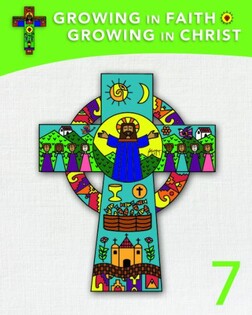Grade 7

The Grade 7 Growing in Faith, Growing in Christ program follows the flow of the liturgical year, respecting the different seasons with all the moods and colours found in them. Drawing on various stories from Scripture, students will learn the mood and meaning of all of the Church seasons. Each season has its own theological emphases, guiding us through the story of our salvation. The content of the units informs and forms our students. Using their gifts and witness of faith, teachers evangelize as they hand on the faith. The Grade 7 Growing in Faith, Growing in Christ program fits nicely within the Church’s evangelizing mission.
The Growing in Faith, Growing in Christ Teacher Resource is organized to follow the sequence of the liturgical year of the Catholic Church. The program highlights and references the liturgical celebrations in the parish for each of the liturgical seasons and connects to the faith and cultural celebrations in the home.
The Grade 7 Teacher Resource comprises the following five units. The length of each unit is based on the number of weeks in the liturgical season.
Unit 1: Preparing for God’s Kingdom begins during the liturgical season of Ordinary Time, a season of growth for the Catholic Church. During this unit, students will explore the Sermon on the Mount from Matthew’s Gospel in-depth, examining it through the lens of solidarity and social justice. They will examine the four-fold structure and content, concentrating on the Beatitudes and the Lord’s Prayer as Jesus taught it. Students will come to understand that the Sermon on the Mount and the Lord’s Prayer are at the centre of the Gospels and summarize the teachings of Christ.
Chapter 1: What Can We Learn about God’s Kingdom from Scripture?
Lesson 1: What does the Sermon on the Mount teach us about God’s kingdom?
Lesson 2: How does understanding the Law of Love deepen our relationship with God?
Lesson 3: How does piety help us strengthen our connection with God?
Lesson 4: How do we keep God first in our lives?
Saints: Blessed Maria Gabriella Sagheddu
Chapter 2: What can we learn about God’s kingdom from prayer?
Lesson 5: How does the Lord’s Prayer lead us to God’s kingdom?
Lesson 6: How does understanding the petitions of the Lord’s Prayer help us lead a Christian life?
Lesson 7: How does the Lord’s Prayer guide us in spiritual life of prayer?
Chapter 3: What can we learn about God’s kingdom from the Mass?
Lesson 8: How does the New Covenant lead us to the kingdom of God on Earth as it is in Heaven?
Lesson 9: How does the celebration of Mass help us remember Christ’s life, death, and resurrection?
Lesson 10: What is the significance of Christ’s presence in the Mass?
Saints: St. Teresa of Avila
Unit 2: Bringing Christ into the World celebrates the beginning of a new liturgical year with the seasons of Advent and Christmas, extending to the Solemnity of Epiphany. In this unit, students will explore the life of Mary and the saints as preparation for the coming of Christ at Christmas and as the Saviour of the world. Students will explore the many devotions to Mary and how these prayers and celebrations lead us in a meaningful way to her Son, Jesus. They will learn that Mary’s witness has inspired heroic virtue in recognized saints throughout the centuries, and that, in turn, these saints inspire us to reach out in compassion and mercy to those around us.
Chapter 4: How does Mary teach us to bring Christ into the world?
Lesson 1: How do Mary’s life and roles guide us to follow her Son?
Lesson 2: How does Mary inspire us through her relationships with Jesus and the Church?
Lesson 3: How does Mary unite the Church?
Saints: St. Juan Diego
Chapter 5: How do the saints teach us to bring Christ into the world?
Lesson 4: How do the saints bring Christ into the world?
Lesson 5: How do the saints inspire us to be witnesses of Christ?
Unit 3: Sacramental Grace for a Life of Service marks the beginning of the calendar year and the beginning of Ordinary Time in the liturgical calendar. In this unit, students will develop a better understanding of their role as baptized members of the Church in continuing Jesus’ mission on Earth. They will examine the concept of vocation and God’s call through an in-depth look at the sacraments of Confirmation, Holy Orders, and Marriage, and the prayers, symbols, and ritual actions associated with each. They will also come to understand the moral basis for the sacrament of Marriage by exploring Bible stories, Church teachings, and the lives of Sts. Louis and Zélie Martin.
Chapter 6: How does Confirmation prepare us to live Jesus’ mission?
Lesson 1: How does the Holy Spirit help us live as followers of Jesus?
Lesson 2: How does Confirmation give us the grace needed to live our vocation?
Saints: Blessed Chiara Badano
Chapter 7: How do the sacraments of service strengthen the Body of Christ?
Lesson 3: How does the sacrament of Holy Orders help fulfill Jesus’ mission?
Lesson 4: How is God’s love reflected in the sacrament of Marriage?
Lesson 5: How does sacramental marriage help couples on their path to salvation?
Saints: Sts. Louis and Zélie Martin
Unit 4: God’s Plan of Salvation focuses on key themes of Lent and Easter and explores the key roles of the three persons of the Trinity. Students will examine scripture passages associated with the passion and death of Jesus to set a tone for repentance and reconciliation. The main focus of this unit will be the four stages of salvation history: from creation, the law, and patriarchs and prophets, to the life, death, resurrection, and ascension of Christ, and then to the work of the Holy Spirit in the Apostles and Church, which continues until the end of the age. Students will learn how these stages have chronicled God’s continuous love for His people and His call to return to Him.
Chapter 8: How is Jesus our salvation?
Lesson 1: How does God’s plan of salvation unfold in Scripture?
Lesson 2: How does Jesus’ death and resurrection accomplish our salvation?
Lesson 3: How does the Resurrection confirm our faith in Jesus?
Saints: Sts. Perpetua and Felicity
Chapter 9: How do the sacraments of service strengthen the Body of Christ?
Lesson 4: How did the Holy Spirit guide the Apostles to continue Jesus’ saving mission?
Lesson 5: How does the Holy Spirit continue to guide the Apostolic Church today?
Lesson 6: How do we the Church live out our apostolic mission?
Saints: St. Jude
Unit 5: Acting in Virtue and Solidarity begins after Easter and continues through Ordinary Time. In this unit, students will explore the theological and cardinal virtues and learn how practising good habits can help them lead virtuous lives. They will explore God’s natural moral law and how a well-formed conscience can assist in decision making, particularly in challenging situations. Students will further explore Catholic social teaching and how we can live lives of solidarity with our brothers and sisters in our own community and around the world to promote charity and justice.
Chapter 10: How does virtue help form our conscience?
Lesson 1: What does it mean to be virtuous?
Lesson 2: How do the virtues help us live faith-filled lives?
Lesson 3: How does God help us make good and loving choices?
Lesson 4: How does following God help us stay on the right path?
Saints: St. Thomas More
Chapter 11: How can we live out God’s call to solidarity?
Lesson 5: How do we demonstrate solidarity?
Lesson 6: How does solidarity lead us to charity and justice?
Saints: St. Oscar Romero
Students will also be learning the prayer:
Magnificat
My soul magnifies the Lord, and my spirit rejoices in God my Saviour,
for he has looked with favor on the lowliness of his servant.
Surely, from now on all generations will call me blessed;
for the Mighty One has done great things for me, and holy is his name.
His mercy is for those who fear him from generation to generation.
He has shown strength with his arm;
he has scattered the proud in the thoughts of their hearts.
He has brought down the powerful from their thrones, and lifted up the lowly;
he has filled the hungry with good things,
and sent the rich away empty.
He has helped his servant Israel,
in remembrance of his mercy,
according to the promise he made to our ancestors,
to Abraham and to his descendants forever.
If you have any questions about the content of this program, please contact LeeAnn Arsenault, Faith Permeation Lead Teacher for Red Deer Catholic Regional Schools at leeann.arsenault@rdcrs.ca.
